Insomnia and Your Health
Blue indicates link
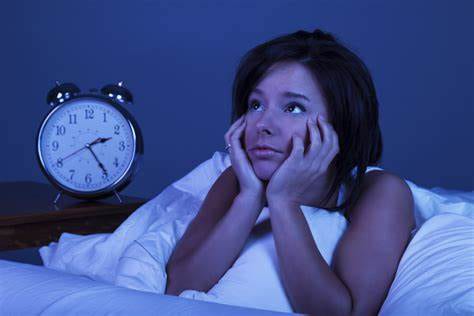
Insomnia, also known as sleeplessness, is a sleep disorder in which people have trouble sleeping. They may have difficulty falling asleep or staying asleep as long as desired. Insomnia is typically followed by daytime sleepiness, low energy, irritability, and a depressed mood. It may result in an increased risk of motor vehicle collisions, as well as problems focusing and learning. Insomnia can be short-term, lasting for days or weeks, or long-term, lasting more than a month.
Other Definitions of Insomnia:
According to guidelines from a physician group, insomnia is difficulty falling asleep or staying asleep, even when a person has the chance to do so. People with insomnia can feel dissatisfied with their sleep and usually experience one or more of the following symptoms: fatigue, low energy, difficulty concentrating, mood disturbances, and decreased performance at work or at school.
Insomnia symptoms may include:
Difficulty falling asleep at night
Waking up during the night
Waking up too early
Not feeling well-rested after a night’s sleep
Daytime tiredness or sleepiness
Irritability, depression, or anxiety
Difficulty paying attention, focusing on tasks, or remembering
Increased errors or accidents
Ongoing worries about sleep
Additional common causes of insomnia include:
Mental health disorders. Anxiety disorders, such as post-traumatic stress disorder, may disrupt your sleep. Awakening too early can be a sign of depression. Insomnia often occurs with other mental health disorders as well.
Medications:
Many prescription drugs can interfere with sleep, such as certain antidepressants and medications for asthma or blood pressure. Many over-the-counter medications — such as some pain medications, allergy, and cold medications, and weight-loss products — contain caffeine and other stimulants that can disrupt sleep.
Medical conditions:
Examples of conditions linked with insomnia include chronic pain, cancer, diabetes, heart disease, asthma, gastroesophageal reflux disease (GERD), overactive thyroid, Parkinson’s disease, and Alzheimer’s disease.
Sleep-related disorders:
Sleep apnea causes you to stop breathing periodically throughout the night, interrupting your sleep. Restless leg syndrome causes unpleasant sensations in your legs and an almost irresistible desire to move them, which may prevent you from falling asleep.
Caffeine, nicotine, and alcohol:
Coffee, tea, cola, and other caffeinated drinks are stimulants. Drinking them in the late afternoon or evening can keep you from falling asleep at night. Nicotine in tobacco products is another stimulant that can interfere with sleep. Alcohol may help you fall asleep, but it prevents deeper stages of sleep and often causes awakening in the middle of the night.
Insomnia and aging:
Insomnia becomes more common with age. As you get older, you may experience:
Changes in sleep patterns. Sleep often becomes less restful as you age, so noise or other changes in your environment are more likely to wake you. With age, your internal clock often advances, so you get tired earlier in the evening and wake up earlier in the morning. But older people generally still need the same amount of sleep as younger people do.
Changes in activity:
You may be less physically or socially active. A lack of activity can interfere with a good night’s sleep. Also, the less active you are, the more likely you may be to take a daily nap, which can interfere with sleep at night.
Changes in health:
Chronic pain from conditions such as arthritis or back problems as well as depression or anxiety can interfere with sleep. Issues that increase the need to urinate during the night ―such as prostate or bladder problems ― can disrupt sleep. Sleep apnea and restless leg syndrome become more common with age.
More medications:
Older people typically use more prescription drugs than younger people do, which increases the chance of insomnia associated with medications.
Insomnia in children and teens:
Sleep problems may be a concern for children and teenagers as well. However, some children and teens simply have trouble getting to sleep or resist regular bedtime because their internal clocks are more delayed. They want to go to bed later and sleep later in the morning.
Risk factors:
Nearly everyone has an occasional sleepless night. But your risk of insomnia is greater if:
You’re a woman.
Hormonal shifts during the menstrual cycle and in menopause may play a role. During menopause, night sweats and hot flashes often disrupt sleep. Insomnia is also common in pregnancy.
You’re over age 60.
Because of changes in sleep patterns and health, insomnia increases with age.
You have a mental health disorder or physical health condition. Many issues that impact your mental or physical health can disrupt sleep.
You’re under a lot of stress.
Stressful times and events can cause temporary insomnia. And major or long-lasting stress can lead to chronic insomnia.
You don’t have a regular schedule.
For example, changing shifts at work or traveling can disrupt your sleep-wake cycle.
Health Issues Caused by Insomnia May Include:
Stroke
Asthma attacks
Seizures
Weak immune system
Sensitivity to pain
Inflammation
Obesity
Diabetes mellitus
High blood pressure
Heart disease
Increased risk for mental health disorders: Click the internal link
These include:
Depression
Anxiety
Confusion and frustration
Performance at work or school
Sex drive
Memory
Judgment
Common causes of chronic insomnia include:
Stress. Concerns about work, school, health, finances, or family can keep your mind active at night, making it difficult to sleep. Stressful life events or trauma — such as the death or illness of a loved one, divorce, or a job loss — also may lead to insomnia.
Travel or work schedule. Your circadian rhythms act as an internal clock, guiding such things as your sleep-wake cycle, metabolism, and body temperature. Disrupting your body’s circadian rhythms can lead to insomnia. Causes include jet lag from traveling across multiple time zones, working a late or early shift, or frequently changing shifts.
Poor sleep habits. Poor sleep habits include an irregular bedtime schedule, naps, stimulating activities before bed, an uncomfortable sleep environment, and using your bed for work, eating, or watching TV. Computers, TVs, video games, smartphones, or other screens just before bed can interfere with your sleep cycle.
Eating too much late in the evening. Having a light snack before bedtime is OK, but eating too much may cause you to feel physically uncomfortable while lying down. Many people also experience heartburn, a backflow of acid and food from the stomach into the esophagus after eating, which may keep you awake.
Other Causes that may be Related to Insomnia:
An irregular sleep schedule
Sleeping during the day
A job that involves working at night
Lack of exercise
Using electronic devices like laptops and cell phones in bed
Having a sleep environment with too much noise or light
The recent death of a loved one
A recent job loss
Various other sources of stress
Excitement about an upcoming event
Recent travel between different time zones (jet lag)
The use of certain substances may have a negative effect on sleep:
Caffeine
Nicotine
Alcohol
Drugs
Cold medicines
Diet pills
Certain types of prescription medications
Complications of insomnia may include:
Lower performance on the job or at school
Slowed reaction time while driving and a higher risk of accidents
Mental health disorders, such as depression, an anxiety disorder, or substance abuse
Increased risk and severity of long-term diseases or conditions, such as high blood pressure and heart disease.
Sleep is as important to your health as a healthy diet and regular physical activity. Whatever your reason for sleep loss, insomnia can affect you both mentally and physically. People with insomnia report a lower quality of life compared with people who are sleeping well.
Insomnia, Sleep Disorders:
Chronic insomnia:
Is disrupted sleep that occurs at least three nights per week and lasts at least three months. Chronic insomnia disorders can have many causes. Changes in the environment, unhealthy sleep habits, shift work, other clinical disorders, and certain medications could lead to a long-term pattern of insufficient sleep. People with chronic insomnia may benefit from some form of treatment to help them get back to healthy sleep patterns. Chronic insomnia can be comorbid, meaning it is linked to another medical or psychiatric issue, although sometimes it’s difficult to understand this cause-and-effect relationship.
May also be associated with medical conditions or the use of certain drugs. Treating the medical condition may help improve sleep, but insomnia may persist after the medical condition improves.
How long does insomnia last?
Insomnia may be characterized based on its duration. Acute insomnia is brief and often happens because of life circumstances (for example, when you can’t fall asleep the night before an exam, or after receiving stressful or bad news). Many people may have experienced this type of passing sleep disruption, and it tends to resolve without any treatment.
Sleep and your age:
Newborns (0-3 months): Sleep range narrowed to 14-17 hours each day (previously it was 12-18)
Infants (4-11 months): Sleep range widened two hours to 12-15 hours (previously it was 14-15)
Toddlers (1-2 years): Sleep range widened by one hour to 11-14 hours (previously it was 12-14)
Preschoolers (3-5): Sleep range widened by one hour to 10-13 hours (previously it was 11-13)
School-age children (6-13): Sleep range widened by one hour to 9-11 hours (previously it was 10-11)
Teenagers (14-17): Sleep range widened by one hour to 8-10 hours (previously it was 8.5-9.5)
Younger adults (18-25): Sleep range is 7-9 hours (new age category)
Adults (26-64): Sleep range did not change and remains 7-9 hours
Older adults (65+): Sleep range is 7-8 hours (new age category)
Medication:
I am not very fond of any type of medication, whether it is prescribed or not. I have dedicated this site to the natural remedies that are available to us. I will be listing a few alternatives further along with this article.
Why You Should Steer Clear of Sleep Medication:
Sleeping pills and other sleep-promoting pharmaceuticals can offer a short-term solution to a temporary bout of insomnia. And plenty of people use them. But often, prescription sleep aids come with unpleasant side effects like headaches, sore muscles, constipation, dry mouth, daytime fatigue, trouble concentrating, dizziness, and more. Add them all up, and they’re about as bad—if not worse–than your garden variety sleep deprivation.
Still, even if you’re one of the lucky few who don’t experience side effects from taking sleeping pills, you likely won’t benefit for long. Most people quickly build up a tolerance to the sedative effects of sleeping medications. This either means that you have to take higher and higher doses to get the same effect, or they stop working altogether.
Consider adding some of these foods to your dinner menu or for a nighttime snack:
Cheese, and turkey
They are rich in tryptophan. Tryptophan is an amino acid that’s needed to produce the neurotransmitter serotonin, which your body needs in order to feel relaxed and sleepy.
Almonds.
The crunchy nuts, too, contain plenty of grog-inducing tryptophan. But that’s not all. Almonds are a good source of both calcium and magnesium, two minerals that experts say are important for achieving quality sleep.
Salmon.
You’ll snooze better if your body has adequate levels of the omega-3 fatty acid DHA, found one British study published in the Journal of Sleep Research. Of course, other omega-3-rich fish like tuna, sardines, or mackerel can get the job done, too.
Whole-grain crackers.
It’s not just a coincidence that you immediately want to take a nap after chowing down on a carb-heavy meal. Carbs cause your body’s blood sugar levels to spike, which appears to play a role in regulating your body’s sleep-wake clock, suggests a recent Japanese study. Still, you’ll probably get a stomach ache and end up tossing and turning all night—by devouring a gigantic bowl of pasta. So pick a lighter option, like a handful of whole-grain crackers.
Cherries.
They’re the only edible source of the sleep hormone melatonin, so consider having a bowlful for dessert. If they’re not in season, opt for thawed frozen cherries or a glass of tart cherry juice. Drinking two glasses daily helped people with insomnia sleep for 90 more minutes, according to one study published in the Journal of the Federation of American Societies for Experimental Biology.
Low-fat milk.
If uncomfortable heartburn keeps you up at night, try a glass of moo juice. The combo of high protein and low carbs can keep acid reflux at bay. Plus, it’s a good source of calcium, which helps keep your body’s melatonin production in check.
Bananas.
The yellow fruits have everything going for them. They’re rich in sleep-promoting carbohydrates and tryptophan, but that’s not all. Bananas also contain potassium and magnesium, which can help promote muscle relaxation.
Make Sleep-Friendly Lifestyle Changes:
You’re exercising, getting plenty of exposure to natural light, and eating better. It all adds up to good stuff, sleep-wise, but there are other lifestyle changes you could be making to snooze more soundly.
A few to consider:
Powering down in the evening. The blue light emitted from your smartphone, tablet, or computer is sort of like an electronic version of caffeine. It leaves your brain feeling revved up, rather than relaxed and ready for sleep. Make it a point to turn off your devices at least an hour before turning in.
Showering at night instead of in the morning:
The heat from a warm, before bedtime shower, sends the message to your nervous system that it’s time to relax and slow down, encouraging you to feel sleepy. This would be more useful at night than first thing when you wake up.
Sniffing lavender before bed:
You might not think so, but the scent can have a powerful effect on your mood. Consider taking advantage of aromatherapy to fill your bedroom with aromas that are thought to ease anxiety and promote relaxation, like lavender, spikenard, vetiver, frankincense, myrrh, and clary sage.
Turn down the temp:
Most experts agree that the ideal temperature for sleep is somewhere between 60 and 72 degrees. Experiment with the thermostat to see what’s right for you.
Turn off the lights:
Exposure to artificial light when you’re trying to sleep isn’t just annoying—it suppresses your body’s production of the sleep hormone melatonin.
Of course, a comfortable bed and wearing something comfortable are pretty obvious. Some people choose not to wear anything, in this case, the linen should be considered.
Stick with bedding made from natural fibers like cotton, wool, silk, bamboo, and linen. Avoid synthetic fabrics like polyester that trap heat and moisture.
More Ideas For A Good Night’s Sleep:
Chamomile tea.
Simple, delicious, and effective. Chamomile tea has been used as a relaxation aid for centuries, but it’s more than just a folk remedy. One review found that the stuff acts as a mild sedative, helping to calm the nerves, reduce anxiety, and ease insomnia. And don’t be afraid to make a strong brew. Some experts recommend using two or three tea bags to get the full, sleep-promoting effect.
St. John’s wort.
The yellow, weed-like flower is commonly used to ease depression symptoms like anxiety and insomnia, and you can steep it to make a tasty tea. Just take care to avoid direct sunlight when you take the stuff since St. John’s wort can make your skin more sensitive to UV rays.
Valerian.
Like chamomile tea, folk practitioners have turned to the root of this flowering plant to ease anxiety and promote relaxation. And it works: According to a review of sixteen studies, Valerian root is shown to help people doze off faster and sleep more soundly. It might not be ideal for long-term use, though, so talk with your doctor before starting a Valerian regimen.
Kava.
The root has long been a favorite among Pacific Islanders for promoting relaxation. In fact, one analysis found that kava was significantly more effective at treating anxiety than a placebo, and some preliminary research suggests it could also help treat insomnia. But like Valerian, long-term use of the stuff isn’t advised, since it could have a negative impact on your liver.
Passion Flower.
The tropical flower acts as a mild sedative—and, bonus, it tastes delicious. Try steeping a teaspoon of passionflower in boiling water for 10 minutes before drinking—and drifting off to dreamland.
Melatonin. (click external link)
You can find melatonin, the hormone that regulates your sleep-wake cycle, in tart cherries. But eating a bowl every night can get boring—not to mention expensive. Melatonin supplements can give you the same sleep-inducing benefit, minus the full belly. To determine the right dose for you, talk with your doctor.
California poppy.
People don’t often want to feel sluggish and lethargic. But when you do—like right before bed—make California poppy your pick. Steep the bright orange leaves in hot water for at least 10 minutes to make a tea that’ll erase your anxiety and leave you feeling relaxed and ready for bed.
Yoga and Meditation For Better Sleep:
Yoga is a gentle and restorative way to wind down your day. A national survey found that over 55% of people who did yoga found that it helped them get better sleep. Over 85% said yoga helped reduce stress. You can use supportive props like bolsters, blankets, and blocks to make poses comfortable so that you can stay in the pose for longer and continue to breathe.
Sleep and Brain Cell Re-Generation:
It goes without saying that we all need a good night’s sleep to feel re-energized for the day ahead. But now, researchers have found that sleep also helps to boost the reproduction of the cells involved in brain repair.
Sleep Contributes to Beautiful Skin:
The wonders of cellular regeneration are always occurring as we go about our daily lives, however, research shows that cellular regeneration almost doubles at night, peaking between 11 pm and 4 am. During our time in la-la land, the production of collagen is boosted, toxins are destroyed and cellular damage is repaired. Get the full eight hours of beauty sleep to give your skin the best chance at renewing itself, and waking up to fresh, glowing skin.
Best Sleep Positions
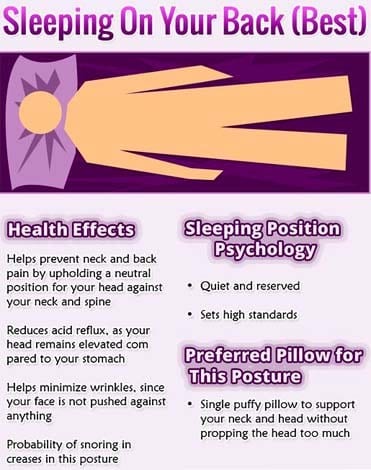
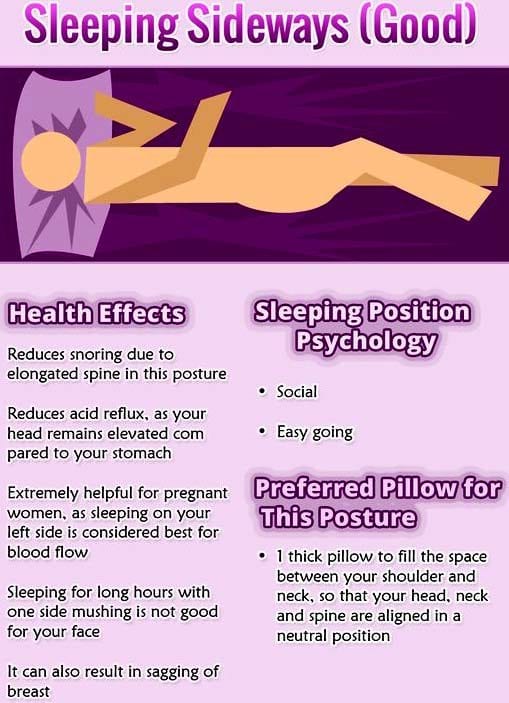
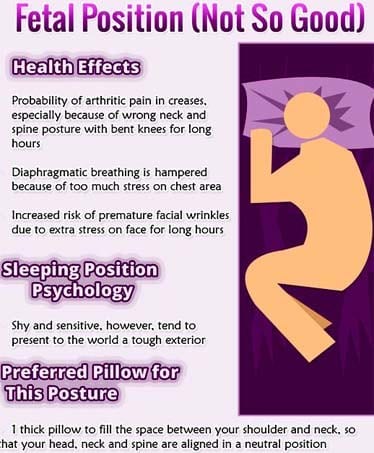
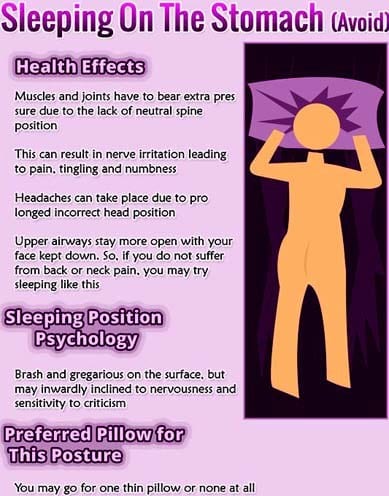
Please know that in this article I am only able to cover some of the major needs for a good night’s sleep. Insomnia or a lack of proper sleep patterns deprives you of the essentials to your right to a healthy lifestyle.
I will try to get better images.
I have only scratched the surface here of the things you can do to revitalize your life through proper and deep sleep. It is so significant but yet we take it for granted.
Please feel free to leave any comments or concerns,
Thank you,
Michael
Your comments are welcomed
Wow the info here is so broad. I never thought that insomnia was a topic that is as deep as this. Having read what you write, I know all about insomnia and why I usually have the disorder now. Stress and bad sleeping habits are the underlying cause for me. I think I know all I have to use when going to bed. I’ll try to stay away from the sleeping pills I use and pick up a new lifestyle. Thanks for the info.
Hi Henderson,
Thank you for your comments. Much appreciated.
Lack of sleep is huge. It affect’s so many aspects in our life, we sometimes just take it as just one of those things. We all need time out’s for whatever. Sleep is so much more. I just hope I covered how essential it is to you.
Please, Henderson try and stay away from sleeping pills, they are just band-aid solutions. They can also be so addictive. I know I used them. You need natural sleep, not medicated sleep.
Best wishes,
Michael
WOW. This was a thorough article. Reading it, I could rule out several of the reasons for insomnia such as medication, stress, travel, health conditions, etc. I think I did key in on my particular issues — poor eating habits, not enough exercise or fresh air. I kind of had that feeling because of the timing. So, all in all, I’m not in bad shape in that I have total control over this situation. I now know what I need to do so thank you for all this information. This is a great site!
~Debbi
Hi Debbi,
Thank you for your comments. I am glad you found the post thorough. I am sure you will be able to overcome your sleep problems.
All the best,
Michael